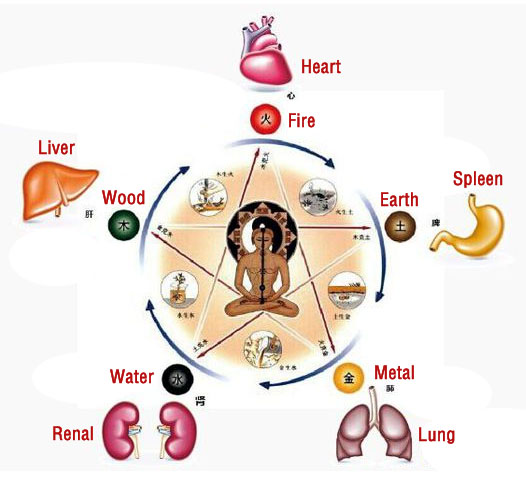The human body is an organic whole. The five zang-organs coordinate with each other physiologically and affect each other pathologically. Under pathological condition, disorder of one organ may be transmitted to another. According to the theory of the five elements, there are two aspects of pathological transmission among the five zang-organs., one includes over restraint and reverse restraint, the other includes disorder of the mother-organ involving the child-organ and disorder of the child-organ involving the mother-organ.
Over restraint and reverse restraint are pathological transmissions due to abnormal change of inter-restraint relationship. Over restraint refers to transmission of disease due to excessive restraint, the order of which is the same as that of inter-restraint. For example, if liver-qi attacks the spleen, spleen-qi will be weakened, leading to dysfunction of the spleen. Reverse restraint refers to transmission of disease due to opposite restraint, the order of which is just contrary to inter-restraint. For example, the lung normally restrains the liver. But if liver-fire becomes hyperactive and invades the lung, it may lead to failure of the lung to depurate.

Mutual involvement or affection of the mother-organ and the child-organ reflects pathological transmission due to abnormal change of inter-promotion relationship. Disorder of the mother-organ involving or affecting the child-organ means that the disease is transmitted from the mother-organ into the child-organ, the order of which is the same as that of inter-promotion. For example, hyperactivity of liver-fire may affect the heart and bring on hyperactivity of heart-fire, leading to superabundance of both heart-fire and liver-fire. Such a transmission is called disorder of the mother-organ involving the child-organ.
Disorder of the child-organ involving or affecting the mother-organ indicates that the disease is transmitted form the child-organ into the mother-organ, the order of which is just opposite to that of inter-promotion. For example, prolonged deficiency of liver-yin affects the kidney and causes deficiency of kidney-yin. Such a transmission is called disorder of the child-organ involving the mother-organ, also known as "the child-organ consuming qi of the mother-organ".







